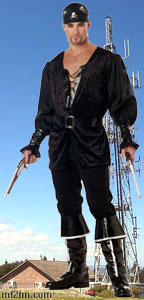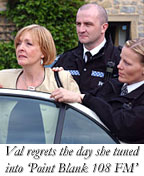Thursday 9 March, 2006, 15:24 - Pirate/Clandestine
 With all this talk of pirate radio, a question that often gets asked is, "But I've never heard a pirate station; where do I find one?". Yes, there are those who have yet to stumble across the skull and crossbones of the airwaves!
With all this talk of pirate radio, a question that often gets asked is, "But I've never heard a pirate station; where do I find one?". Yes, there are those who have yet to stumble across the skull and crossbones of the airwaves!The best place to look is on the FM dial of your radio. But with so many stations around, how do you know if the station you are listening to is a pirate or a legal station? There are a few clues which even the least experience listener should be able to fathom:
1. The signal is in mono. Most pirate stations broadcast in mono, however, this is not at all conclusive as many RSL stations do this too and further, some pirates broadcast in stereo.
2. There is no RDS. Including RDS can be complicated for some pirates so they choose not to use it. This is still not totally conculsive though, as some RSL stations have no RDS either.
 3. The RDS is 'scrolling' (i.e. it is changing to display a message - as shown here on the right). Legal stations in Europe are obliged by the European Commission to use a static name on their RDS display to make sure drivers aren't distracted. Pirates, however, can change the name of the station to display messages on RDS equipped radios. A few legal stations (not in the UK though) do scroll or rotate the message on the RDS display so this too isn't totally conclusive, however reading the message might give a good indication. If it's advertising a party at a local night club then chances are you're listening to a local pirate!
3. The RDS is 'scrolling' (i.e. it is changing to display a message - as shown here on the right). Legal stations in Europe are obliged by the European Commission to use a static name on their RDS display to make sure drivers aren't distracted. Pirates, however, can change the name of the station to display messages on RDS equipped radios. A few legal stations (not in the UK though) do scroll or rotate the message on the RDS display so this too isn't totally conclusive, however reading the message might give a good indication. If it's advertising a party at a local night club then chances are you're listening to a local pirate!4. The presenter doesn't have a middle-class accent! This is especially true on FM stations in the UK, where legal stations try to recruit presenters with unoffensive voices that won't turn listeners off. As pirate stations are usually there to promote the music or club nights, whether the presenter can pronounce 'Douglas St.John Farquhar' correctly really doesn't matter!
 5. The phone number being given out to contact the station is a mobile number (all mobile numbers begin with '07' in the UK). How many legal stations do you know who would, or would need to, use a mobile number for calls to the studio? Further, if you're requested to leave 'missed calls', i.e. to phone the number but not let it answer, you're almost certainly onto a pirate. This is a way to show you are listening without having to spend a single penny on phone calls - quite smart really!
5. The phone number being given out to contact the station is a mobile number (all mobile numbers begin with '07' in the UK). How many legal stations do you know who would, or would need to, use a mobile number for calls to the studio? Further, if you're requested to leave 'missed calls', i.e. to phone the number but not let it answer, you're almost certainly onto a pirate. This is a way to show you are listening without having to spend a single penny on phone calls - quite smart really!Of course there are other clues, such as the frequency being used (if it's in the middle of the band used for national BBC stations but isn't a BBC station then it's most likely a pirate), but the ones above don't require any technical knowledge. You're more likely to find a pirate station on FM if you live in, or near, a major city than if you live out in the countryside, but you might be surprised.
Another place to find pirates is in the radio no man's land just at the edges of the normal short-wave broadcast bands, especially the lower frequency bands. Why the lower frequency bands in particular - they're better for broadcasting to nearby areas and tend to be more reliable throughout the daily propagation cycle. Good places to listen for pirate short-wave stations are:
* 3800-3950 and 4000-4100 kHz, either side of the 75m broadcast band
* 5750-5900 and 6200-6400 kHz, either side of the 49m broadcast band
* 6800-7000 and 7350-7600 kHz, either side of the 41m broadcast band (avoiding the 40m amateur band too)
* 9300-9400 and 9900-10000 kHz, either side of the 31m broadcast band
And so on either side of the other short wave broadcast bands too... Though the use of frequencies above about 10 MHz is rarer, there are examples such as Alfa Lima on 15070 (± a bit) and 21900 (± a bit) kHz and WR International on 12256 kHz.
 One final place you might come across a pirate station is on the medium wave (MW) band. Most stations prefer FM for local broadcasting as the antennas are smaller and the equipment easier to get hold of, but a few stations do use MW. Radio Free London used to put out a good signal across London on 819 kHz and there are quite a few stations (particularly in continental Europe) who inhabit the no man's land just off the end of the MW band between 1611 and 1640 kHz.
One final place you might come across a pirate station is on the medium wave (MW) band. Most stations prefer FM for local broadcasting as the antennas are smaller and the equipment easier to get hold of, but a few stations do use MW. Radio Free London used to put out a good signal across London on 819 kHz and there are quite a few stations (particularly in continental Europe) who inhabit the no man's land just off the end of the MW band between 1611 and 1640 kHz.Of course I couldn't possibly condone any activity which would lead you to listen to a pirate and thus break the law in doing so. But at least now you might be able to stop yourself from committing this heinous crime before you get caught!
